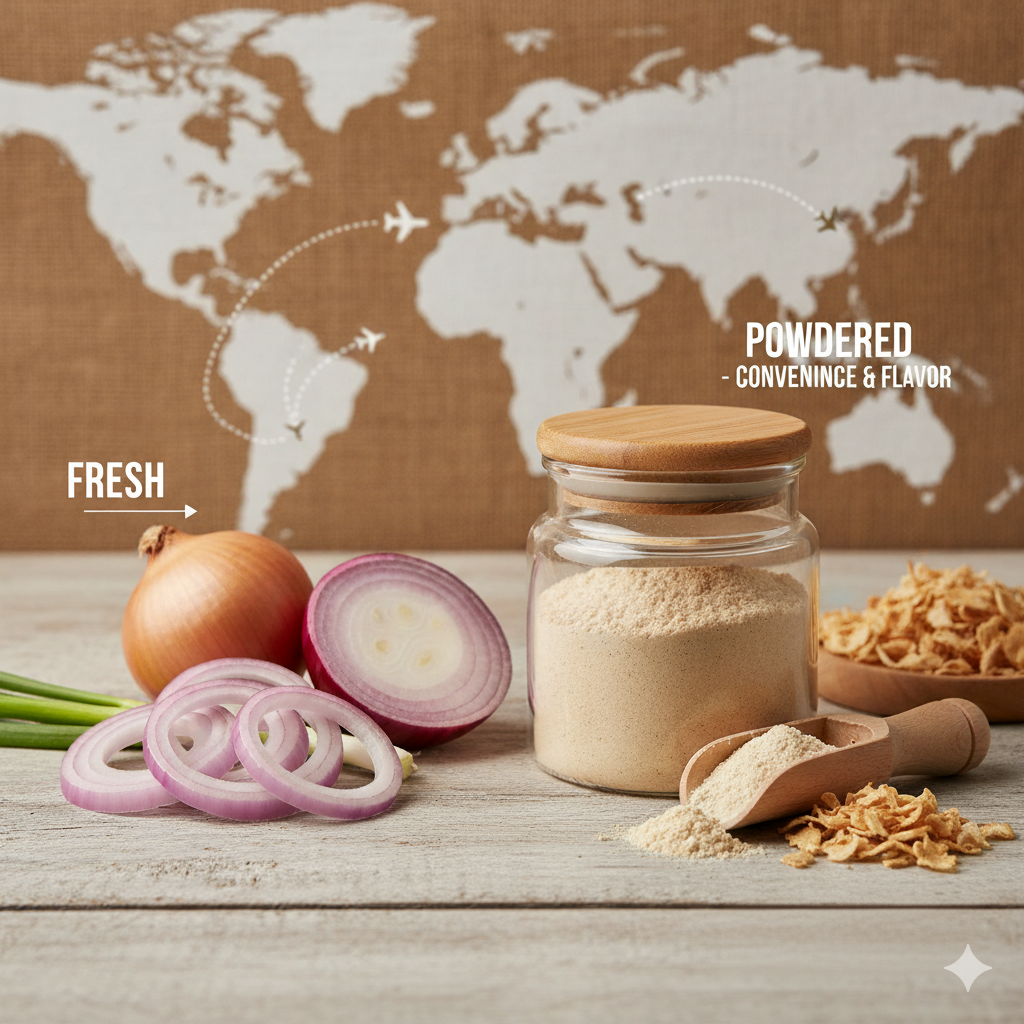Why Powder? The Benefits of Onion Powder vs. Fresh
In today’s fast-paced kitchens—whether at home or in the food industry—onion powder has become a pantry staple for professionals and home cooks alike. But what makes onion powder stand out in comparison to fresh onions? This comprehensive guide explores the key differences, unique advantages, and best uses of onion powder so you can confidently choose the right form for your culinary creations.
What Is Onion Powder?
Onion powder is made by dehydrating fresh onions and finely grinding them into a concentrated, aromatic powder. This simple process retains much of the onion’s essence while removing moisture, resulting in a shelf-stable ingredient that integrates easily into countless recipes.
Flavor and Texture: Consistency vs. Fresh Bite
- Fresh Onions:
Boast a sharp, pungent, and slightly sweet flavor with significant moisture and crunch. They’re key for dishes where mouthfeel, bite, and subtle flavor variations matter—think fresh salads, salsas, and garnish. - Onion Powder:
Offers milder, more uniform onion notes—minus the moisture and sharp bite. Its flavor is concentrated and easy to distribute evenly throughout spice blends, dry rubs, and liquid recipes like soups, gravies, and marinades.
Key Takeaway: Use fresh onions for bold flavor and texture, and onion powder for consistent, mellow onion flavor without visible bits or added water.
Shelf Life and Storage Efficiency
- Fresh Onions:
Last for several weeks in a cool, well-ventilated space. Once cut, they must be refrigerated and are best used within a week to prevent spoilage. - Onion Powder:
Remains shelf-stable for up to three years when stored in a sealed, dry container, making it ideal for bulk use, emergency kits, and food service.
Key Takeaway: Onion powder is the clear winner for space-saving, long-term storage with virtually zero waste.
Nutrition: Concentration vs. Variety
- Fresh Onions:
High water content (nearly 89%) delivers vitamin C, B vitamins, fiber, and a range of antioxidants and organosulfur compounds—including quercetin and saponins—linked to immune, digestive, and heart health. - Onion Powder:
Due to dehydration, nutrients become more concentrated per gram. It has higher amounts of certain minerals, like calcium, magnesium, and iron per serving—but some heat-sensitive vitamins (especially vitamin C and some B vitamins) are lost during processing. - How You Use It:
Because onion powder is potent, recipes use it in small amounts. The ultimate nutritional impact per dish is typically less than with fresh onions, but the beneficial antioxidants and anti-inflammatory compounds largely remain.
Key Takeaway: Both forms provide valuable health benefits, with onion powder offering convenience and mineral concentration, and fresh onions bringing water-soluble vitamins and texture.
Cooking Flexibility
- Onion Powder’s Strengths:
Integrates instantly into spice rubs, dry mixes, batters, marinades, and even snacks like popcorn or roasted nuts.
Leaves no chunks or fibers, making it perfect for smooth sauces, burger patties, and sausages.
Saves prep time and eliminates tears from chopping. - Fresh Onion’s Strengths:
Provides moisture and bulk to dishes like stir-fries, braises, curries, and anything requiring caramelization.
Brings out complex, sweet-savory notes when sautéed or roasted.
Key Takeaway: Onion powder is unbeatable for recipes demanding smooth texture, uniform flavor, and zero prep. Fresh onions are essential for moisture, bulk, and complex cooked flavors.
Practical Convenience
- No Peeling, No Tears:
Onion powder removes the hassle and eye irritation of chopping onions. - Quick Substitution:
Easily used when fresh onions are unavailable. - Measured Consistency:
Standardized strength ensures every batch tastes the same—critical for food manufacturers and busy restaurants.
When to Use Which? (And Substitution Tips)
- One medium onion ≈ 1 tablespoon onion powder (or 3-4 tablespoons for milder effect).
- Use onion powder in any dish where you want onion flavor without the bulk.
- Use fresh onions when texture, moisture, or caramelization are needed.
Conclusion
Both onion powder and fresh onions have an important place in modern cooking. Onion powder is a must-have for those looking for convenience, longevity, and concentrated flavor, while fresh onions remain irreplaceable for texture and certain nutritional benefits.
Add onion powder to your pantry for all the flavor—with none of the fuss!



